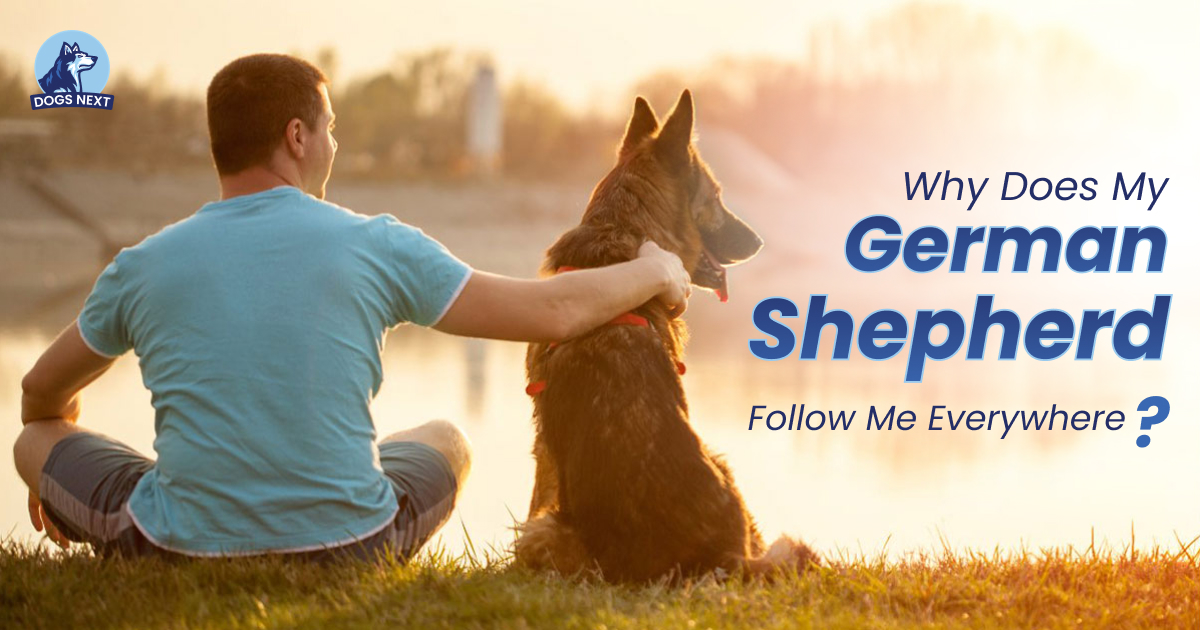German Shepherds are one of the most loyal and intelligent dog breeds, known for their affectionate and protective behavior towards their owners. If you’re a German Shepherd owner, you might have noticed that your furry friend follows you everywhere, from room to room, and even outside.
In this article, we will explore the psychology behind why German Shepherds tend to follow their owners everywhere. We’ll discuss their instincts, social needs, and how to manage their behavior. Understanding your dog’s behavior can strengthen your bond and improve your overall relationship.
Why German Shepherds Follow you Everywhere! The Root of the Behavior
Pack Instincts
German Shepherds are bred to be working dogs, which means they have strong pack instincts. They are social animals that are hardwired to follow the alpha of the pack, which in their eyes is you, the owner. This behavior is deeply ingrained in their genetics, and it’s what makes them such loyal and devoted companions.
Separation Anxiety
Another reason why your German Shepherd may be following you everywhere is that they suffer from separation anxiety. This is a common condition that affects many dogs, especially those who are left alone for long periods. When left alone, dogs can become anxious, stressed, and even depressed. Following their owners everywhere can be a way for them to cope with this anxiety and feel more secure.
Need for Companionship
German Shepherds are very social animals and they thrive on companionship. They love being around their owners and other people, and they enjoy being a part of the family. When they follow you everywhere, it may be because they want to be close to you and feel a sense of security and comfort in your presence.
Lack of Exercise or Stimulation
If your German Shepherd is not getting enough exercise or mental stimulation, they may become bored and restless. Following you everywhere can be a way for them to seek attention and stimulation. Make sure your dog gets plenty of exercises and mental stimulation to keep them happy and healthy.
Training and Reinforcement
Finally, it’s important to remember that your German Shepherd’s behavior is not random or unpredictable. Dogs respond to training and reinforcement, and you can shape their behavior through positive reinforcement techniques. If you want to discourage your dog from following you everywhere, you can teach them to stay in one place or redirect their attention to other activities. Consistency and patience are key when it comes to training your dog.
Tips for Managing the Behavior
German Shepherds are loyal dogs that thrive on human interaction and are known for following their owners everywhere. However, this behavior can sometimes become excessive or problematic. Here are some tips for managing your German Shepherd’s behavior:
- Establish rules and boundaries early on to prevent behavior problems from developing. For example, train your German Shepherd to follow basic commands such as “sit,” “stay,” and “come.”
- Use positive reinforcement to encourage good behavior. This can include treats, praise, and playtime.
- Give your dog plenty of exercises and mental stimulation to prevent boredom and restlessness. German Shepherds are active dogs that require daily walks, playtime, and training sessions.
- Socialize your dog with other people and dogs from an early age. This can help prevent aggression and anxiety.
- Be consistent with your training and always remain calm and patient. German Shepherds respond well to positive reinforcement and may become anxious or stressed if you use punishment or physical force.
Benefits of Having a Loyal Dog
German Shepherds are known for their loyalty and devotion to their owners. Here are some benefits of having a loyal dog like a German Shepherd:
- A loyal dog can provide companionship and comfort, which can help reduce stress and anxiety.
- German Shepherds are protective by nature and can make excellent guard dogs.
- A loyal dog can help you feel safe and secure, especially if you live alone.
- German Shepherds are intelligent and trainable, which can make them good candidates for therapy dogs or assistance dogs.
- A loyal dog can provide a sense of purpose and responsibility, which can be beneficial for children and adults alike.
Understanding Your Dog’s Needs
To be a responsible dog owner, it’s important to understand your German Shepherd’s needs. Here are some things to consider:
- German Shepherds are active dogs that require daily exercise and mental stimulation. Without enough exercise and stimulation, they may become bored, restless, or destructive.
- German Shepherds are social animals that thrive on human interaction. They may become anxious or stressed if they are left alone for long periods.
- German Shepherds are loyal and protective by nature, but they need to be socialized and trained to prevent aggression or anxiety.
- German Shepherds have specific nutritional needs and may be prone to certain health issues, such as hip dysplasia and bloat. Talk to your veterinarian about the best diet and health care plan for your dog.
Common Behavior Problems and Solutions
German Shepherds are generally well-behaved dogs, but they may exhibit certain behavior problems if they are not properly trained or socialized. Here are some common behavior problems and solutions:
- Excessive barking: Teach your German Shepherd to “speak” and “quiet” on command, and use positive reinforcement to encourage quiet behavior.
- Separation anxiety: Gradually acclimate your dog to being alone, and provide plenty of toys and distractions to keep them occupied.
- Aggression: Socialize your German Shepherd early on, and use positive reinforcement to encourage good behavior. If necessary, seek the help of a professional dog trainer.
- Destructive behavior: Provide plenty of toys and chews to keep your dog occupied, and crate-train them if necessary.
Fun Activities to Do with Your German Shepherd
German Shepherds are active and intelligent dogs that need plenty of mental and physical stimulation. Here are some fun activities you can do with your German Shepherd to keep them entertained and engaged:
- Go for a Hike: German Shepherds love exploring and hiking with their owners. Find a local hiking trail and take your German Shepherd with you. Make sure to bring plenty of water and snacks for both you and your furry companion.
- Play Fetch: German Shepherds love playing fetch, and it’s a great way to get them some exercise. Use a ball or frisbee and play in a secure area like a backyard or park.
- Agility Training: German Shepherds are quick learners and love to be challenged. Set up an agility course in your backyard or find a local training center that offers agility classes. This will not only provide physical exercise but also mental stimulation.
- Swimming: Many German Shepherds enjoy swimming, and it’s a great low-impact exercise that’s easy on their joints. Take your German Shepherd to a nearby lake or beach and let them have a dip.
- Obedience Training: German Shepherds thrive on learning and pleasing their owners. Enroll your German Shepherd in obedience training classes, where they can learn new commands and improve their behavior.
Some Tips to Stop My German Shepherd from Following Me Everywhere?
As much as we love our loyal German Shepherds, sometimes their constant following can become overwhelming. Here are some tips to manage this behavior:
- Give your dog space: Encourage your dog to explore and play on their own by giving them a separate space to be in. You can use a crate, bed, or designated area in your home.
- Increase exercise: A tired dog is a happy dog. Ensure that your German Shepherd is getting enough exercise and mental stimulation throughout the day, which can help decrease their desire to follow you everywhere.
- Positive reinforcement training: Use positive reinforcement training techniques to teach your dog new commands and behaviors, such as “stay” or “wait”. This can help redirect their attention away from following you all the time.
- Provide mental stimulation: Give your dog toys that provide mental stimulation, such as puzzle toys, to keep them occupied and mentally stimulated when you are not around.
- Seek professional help: If the behavior persists or becomes excessive, it may be time to seek professional help from a dog behaviorist or trainer.
Frequently Asked Questions
Q: Do German Shepherds have one favorite person?
Ans: German Shepherds are known to bond closely with their owners, but they can have affection for multiple people in their family.
Q: Why does my German Shepherd watch me all the time?
Ans: German Shepherds are very loyal dogs and naturally protective of their owners. They may watch you constantly as a way to stay aware of your movements and keep you safe.
Q: Why do German Shepherds follow you into bathroom?
Ans: German Shepherds have a strong pack mentality and see their owners as part of their pack. They may follow you to the bathroom out of a desire to stay close and maintain a sense of security.
Q: Why is my GSD so clingy?
Ans: German Shepherds are social and loyal dogs who enjoy spending time with their owners. They may become clingy if they are not receiving enough attention, exercise, or mental stimulation. It can also be due to anxiety or stress.
Conclusion
In conclusion, having a loyal companion like a German Shepherd can bring so much joy and happiness to your life. However, the constant following behavior can become overwhelming. By understanding the root of this behavior, you can learn how to manage it effectively and still enjoy the bond with your furry friend.
Remember to provide your German Shepherd with plenty of exercises, mental stimulation, and positive reinforcement training to help them break the habit of following you everywhere. With patience and consistency, you can achieve a balanced and healthy relationship with your dog.
So, if you’ve been wondering, “why does my German Shepherd follow me everywhere?” now you know the answer and how to manage it. Don’t forget to enjoy all the benefits of having a loyal and loving companion by your side.

I’m David, an expert contributor and writer, with two furry friends of my own, I know the challenges of raising and caring for dogs. From training to nutrition and health, my goal is to provide valuable insights and advice to help create strong bonds and happy, healthy lives. Find me in Twitter.




